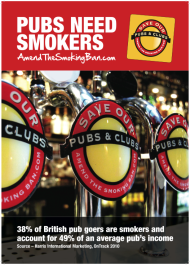Lansley unveils Tory proposals on health
 Wednesday, January 13, 2010
Wednesday, January 13, 2010 Further to yesterday's post about Conservative policy on obesity, smoking and alcohol, shadow health spokesman Andrew Lansley will today unveil new proposals designed to help people control their alcohol consumption.
Speaking on the Today programme this morning, Lansley said: "What I'm publishing today is a public health Green Paper that sets out a broader strategy. Alcohol and the abuse of alcohol and the deaths that are associated with it and the £20 billion cost to society of the misuse of alcohol is clearly a very significant public health challenge."
This morning Lansley is giving a speech at an event organised by 2020health, a centre right think tank.
More information to follow.
 Simon Clark
Simon Clark
Here are some excerpts from the press release just received:
A Conservative Government will work with business to draw up new 'responsibility deals' designed to prevent irresponsible activities and extend restrictions on
unsuitable marketing to children throughout the media. We will introduce a clearer system of alcohol labelling which allows people to compare the amount they drink
with other people, mandate the display of 'guideline daily amounts' on food packaging, and encourage restaurants and bars to publish more dietary information for their customers.
We will introduce a focus on public health throughout government, led by the Secretary of State for Public Health, with a series of measures including extra Sure
Start health visitors, a school sports Olympics, better maternity care, and tough measures - including a tax on super-strength drinks - to curb binge-drinking.
The Department of Health will be renamed and refocused, becoming the Department of Public Health, with a stronger remit for preventing disease, rather than just its
cure. Whenever possible, we will ensure that national public health initiatives funded by public money are focused wholly on behaviour change and paid for on the
basis of the results they achieve.
We will extend voluntary restrictions on marketing to children to all media, including online advertising, and support industry-led initiatives to promote better health, such as reducing food portion sizes.
We will also work with business to encourage the publication of dietary information in fast-food outlets, restaurants, cafes and bars, and improve the clarity of information on food packaging by supporting EU proposals for mandatory publication of 'guideline daily amounts' on food packaging.
To tackle the specific problem of binge-drinking, there will be a ban on cheap alcohol used as a loss leader in shops and supermarkets, and problem drinks like alcopops and super-strength beers will be taxed more heavily. A tougher licensing regime will also be introduced to tackle irresponsible bars.
There is no direct mention of smoking in the press release but in his speech this morning Lansley said:
We will invest to save by prioritising public health. There is a vast human and financial cost associated with problems like obesity, sexually transmitted diseases and infectious diseases.
Preventing them makes good economic sense and good public health sense. Obesity costs the NHS £4.2 billion alone. Smoking is responsible for around 84,000 deaths a year.
We are seeing a rising rate of alcohol and drug problems. And there's been a three-fold increase since 1998 in the number of young people diagnosed with HIV. We have to get to grips with the real drivers of demand on our NHS now.
Make of that what you will.
 Simon Clark
Simon Clark
"Is this the second longest suicide note in history?" comments Rick S. "Don't the Tories know that people are sick of this stuff and just want to be left alone?"
What the Tories have to get across - fast - is the extent to which these measures are going to be enforced: nanny state or bully state? I understand the need to keep NHS costs in check but government has to acknowledge that smokers (for example) pay a huge sum of money into the public purse (in addition to income tax etc). If anyone is entitled to treatment on the NHS, it's smokers.
Properly targetted, these policies may do some good. What politicians must not do is target and stigmatise everyone who smokes, gets "drunk" or is overweight.











